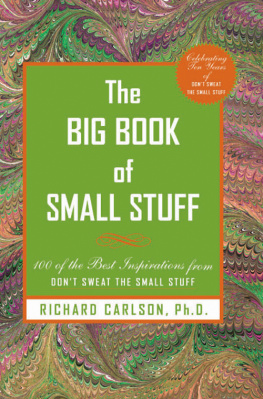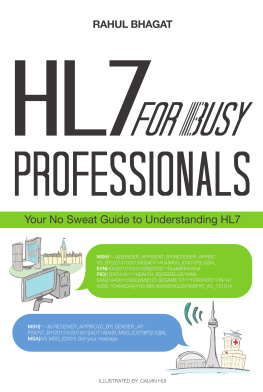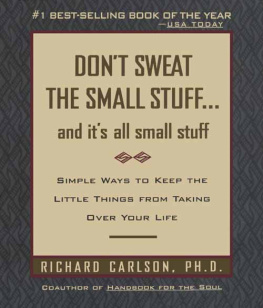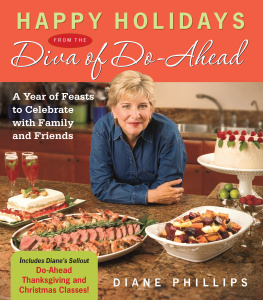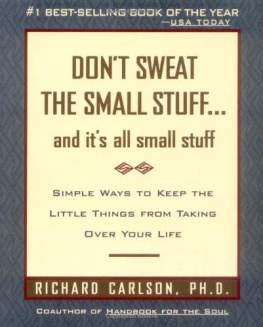THE DONT SWEAT GUIDE
TO HOLIDAYS
Enjoying the Festivities and
Letting Go of the Tension
By the Editors of Dont Sweat Press
Foreword by Richard Carlson, Ph.D.

Contents
T o many, the holidays represent the best of times and the worst of times. They are both joyful and at the same time stressful. Its a strange thing. We love our family and friends more than just about anyone, but somehow, our interaction with them causes us the most distressparticularly during the holidays.
Even the media emphasizes the stress somehow created by the holidays. Sure, it mentions the joysparticularly the superficial parts, such as shoppingbut there is a lot of emphasis on the loneliness and emptiness, as well. The advertisers would like us to believe that if we just would buy and receive the right giftsand bump up our credit card billsall will be fine. Deep down, however, we know thats not the answer.
The editors of Dont Sweat Press have done a stellar job at explaining this strange dynamic, and more importantly, they have created effective strategies to deal with it. They explain, in easy-to-understand and simple ways, how to deal with the stress that we usually associate with the holidays.
This book covers everything from finding ways to simplify the holidays, to saving time and money, increasing creativity, and making the entire season more satisfying. It will help you anticipate the holidays in a more positive light, making the best of each and every day along the way, and creating better memories. It will help you remember the true meaning of what the holidays are aboutGod, family, giving, and love. It will remind you of the gift of service, of helping those in need. And in my opinion, the wisdom of this message will spread through your life during the rest of the year.
One thing is certain. Like clockwork, the holidays will be here every single year of your life, whether you want them to be or not. Theres no escaping them. They can be stressful, miserable and overwhelmingor they can be fun, filled with laughter, and something you look forward to. This book can point you in the direction of making the holidays the priceless gift that God intended them to be; a celebration. I wish you a happy holiday season, as well as a happy rest of the year. Im convinced that anyone reading this book will have one of the best holidays ever!
Richard Carlson
Benicia, California, April 2003
1.
Plan the Best Holidays for You
H olidays are the highlights of our lives. Many of our most cherished memories are wrapped around holiday celebrations. Much of what we envision for the future is tied to holidays. Some of our most far-reaching charitable work is inspired by them. These special occasions are parties, reunions, incentives, and yardsticks, all wrapped in the same package.
Certain holidays commemorate the departed, while others focus more specifically on the lives and accomplishments of visionaries. We remember the heroes of the battlefield on Veterans Day and the heroes of industry on Labor Day. We honor our country (Independence Day, Flag Day) and our environment (Earth Day, Arbor Day). These are just our secular holidays. When you add religious observances and festivals, you have a calendar packed so full of tributes and special events that if youre of a mind, you can celebrate virtually nonstop.
Along with this attention to celebration comes the pressure to make every holiday a winner. Our sense of urgency is intensified by TV and movies, which beguile us with unrealistic holiday modelsfantasy families enjoying fantasy celebrations. At work, our colleagues routinely inquire, What are you doing for the holiday? as if it were a given that we would be planning something extraordinary. Too often, we convert these external cues to internal pressure to create memorable events. If we cant measure up to our outsized expectations, our holidays become disappointments rather than sources of satisfaction.
You can avoid holiday pressure by establishing your own agenda for each of these special days. Dont try to fashion your holidays after the fairy tales that the mass media concocts. You have a real-world agenda that will point you in the right direction. If friends ask what youre planning for the holiday, dont be embarrassed or reluctant to respond, Nothing in particular. Planning what is right and best for you is what makes the holiday special.
2.
The 4-P Approach to Happy Holidays
H olidays are deceptively demanding. We think of them as a respite, as time off, but are they really that? Think about the roster of holidays that most of us observeMartin Luther King Jr. Day, Presidents Day, Easter/Passover, Mothers Day, Memorial Day, Fathers Day, Independence Day, Labor Day, Halloween, Veterans Day, Thanksgiving, Christmas/Hanukkah, and New Years. Celebrate each of these holidays as the months roll along, and you could be involved in nearly year-round planningand worrying about the outcome. Daunting as this list seems, its probably shorter than your actual lineup.
If you treat these occasions seriouslythat is, you work diligently to put together the best affairs for your family and friendsyou wont find much time to have fun. In fact, anxiety and tension can accompany most holidays more than any enjoyment or satisfaction. To help assure that your holidays are joyous, consider the 4-P approach.
Prioritize. Decide which holidays you want to emphasize, and then focus most of your attention there. Also, prioritize your goals for your key holidays. For those holidays that are low on your priority list, go with the flowand dont take on more than you can handle comfortably.
Plan. Map out the ideal holiday for you. Determine what elements youll need, how much theyll cost, and what resourcesfinancial and humanyou can bring to bear. Develop a task list and an implementation schedule for your party plan.
Publicize. Your plan may seem perfect to you, but if it isnt equally amenable to the folks with whom youll be sharing your holidays, it could generate frustration rather than enthusiasm. Think of your plan as a proposal that must be reviewed and critiqued by all involved. Youre accustomed to doing this at the office, where consensus often is critical, but its just as essential on the home front. Once you collect feedback, revise your plan to reflect the new input.
Party. When youve established your holiday priorities, developed a preliminary plan, publicized your blueprint among key audiences, and modified it according to their suggestions, youre ready to cut loose and enjoy yourself. This final P is every bit as important as the other three, since more enjoyable holidays for you is the ultimate objective.
3.
Whose True Meaning?
I f you watch television news as a major holiday approaches, youre likely to hear a commentator lament about the commercialization of holidays and encourage us to get back to the true meaning of the event ahead. It seems a noble, even sobering thought, suggesting as it does that weve been squandering our energy on something less than the true meaning of the holiday. However, this pronouncement wont hold up to close scrutiny. We might well ask this pundit, Whose true meaning are you talking about? In our melting pot of a society, holidays mean many things to many people.
To some, holidays are principally religious occasionsspecial opportunities for worship, contemplation, or even repentance. For these people, the decorations, feasts, and other customs associated with holidays may have secondary meaning only.
Next page

